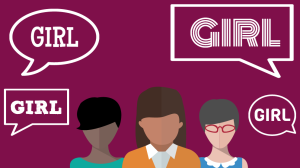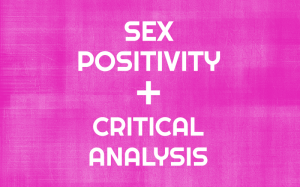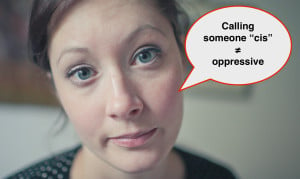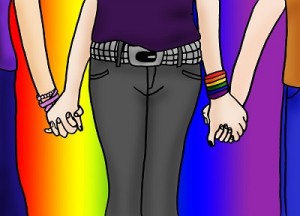
Caption: Getty Images
As a humanist feminist anti-racist pacifist whateverist, I have wondered whether or not all the –ists and –isms aren’t a bit redundant. Why can’t I just be an equal-rights-all-across-the-board-ist?
So I understand the sentiment behind asking “Why not just call yourself a humanist instead of a feminist?” Or: “Why not call this site Everyday Humanism instead of Everyday Feminism?”
After all, isn’t the cornerstone of all social change the recognition that all humans are, in fact, human and therefore equal?
Absolutely.
But does that mean that we can only have one –ism in the social justice world?
I’m going to have to say no.
Because while I like the sentiment behind having one big general human rights movement (which is essentially what all social change movements everywhere are doing anyway as they work alongside each other), there’s still a place for each one in theory and practice – including feminism.
Humanism and feminism are not mutually exclusive and can coexist. Here’s why:
1. Feminism + Men’s Rights ≠ Humanism
Humanism. We keep using that word, but does it mean what we think it means?
Humanism is not a word for a social change or political movement as feminism is. Rather, it refers to several branches of philosophical and secular thinking that have their origins in 13th century renaissance thought.
So although modern-day humanists can be politically and socially active, the term humanism doesn’t have the political or human rights implications that feminism does.
It would actually make more sense to compare feminism to humanitarianism, not humanism.
2. Being Specific Does Not Mean Being Exclusive
So, you ask hypothetically, even if we use a term other than humanism, wouldn’t it still be better to have a general movement toward all human beings instead of more specific ones like feminism? Doesn’t a term like feminism create a counter-intuitive divide based on gender that we should be working to diminish?
Well, no.
Saying that we can’t have feminism because we should only focus on general human rights is like saying we can’t have oncologists because some doctors are general practitioners.
It’s like saying that oncologists are bringing so much attention to cancer that no one cares about typhoid or influenza anymore, simply because oncology exists.
It’d make more sense to say that by specializing in the field of oncology, some doctors are more equipped and informed to fight cancer, though they also care about the health of all people and are still highly informed about the state of general medicine.
Likewise, oncologists share their cancer expertise with the entire medical field.
The same could be said for feminists (or womanists, or LGBTQ rights activists, or anti-racists, or reproductive rights activists).
Focusing on the problems facing a specific set of people, especially when these are problems you are passionate about solving, doesn’t mean forgetting that all other problems exist.
It means being so informed and focused in working with a specific population that you can be a resource for the population you serve and for people who are doing more general work.
3. Feminism is Not Only About Gender or Women
That all being said, feminism isn’t necessarily only for women or only about gender.
A lot of what we call feminism today is focused on getting rid of that whole problematic patriarchy thing that not a lot of other –isms are centered on resisting.
The thing about patriarchy – a social system (like ours) in which men have the most power – is that it hurts everyone.
Although feminism has partially been about getting women a more equal share of power, it must also acknowledge the ways in which patriarchy plays a role in all kinds of social ills: racism, homophobia, and xenophobia, to name a few.
Not to mention that men themselves are hurt by a system in which men have the most power.
The expectations of patriarchy in our society – stoicism, rigid gender expression, high expectations of strength and bacon-winning – hurt men in ways that feminists should absolutely give a damn about (and do!).
4. A Lot of –isms Work Together
That is to say: You can be a humanist and a feminist at the same time.
As a humanist feminist, I can gladly say that the space-time continuum is still intact along with my identity.
Just because someone identifies with one highly-politicized term (in this case, feminist) doesn’t mean they don’t have a multifaceted interest in other causes.
A person can be a feminist and an environmentalist and a humanist and a scientist or any other combination of –ists that make up a single person with a vested interest in all human rights.
However, some people do feel that terms like feminist limit their ability to express the scope of their activism or thinking. That’s fine.
But feminists who don’t feel trapped by the “label” of feminism don’t want to be mistaken for people who only care about women’s rights and nothing else. To say that feminism is restrictive or divisive is to misunderstand its potential.
It wouldn’t make sense for feminists to advocate for the equality of all women if that didn’t include women of every race, sex, and orientation. It wouldn’t make sense for feminists to advocate for gender equality if they hated men. It wouldn’t make sense to be a feminist who doesn’t support equal rights for all people.
A vested interest in general human welfare is an implicit goal of feminism. If you’re helping women, you’re helping people.
Some might prefer to call this humanitarianism, humanism, or being-a-decent-human-being-ism, but many of us are content to call it feminism. And there’s nothing exclusionary about that.
Want to discuss this further? Login to our online forum and start a post! If you’re not already registered as a forum user, please register first here.
Jarune Uwujaren is a Nigerian-American student recent grad who’s stumbling towards a career in writing. Jarune can currently be found drifting around the DC metro area with a phone or a laptop nearby. When not writing for fun or profit, Jarune enjoys food, fresh air, good books, drawing, poetry, and sci-fi. Read her articles here.
Search our 3000+ articles!
Read our articles about:
Our online racial justice training
Used by hundreds of universities, non-profits, and businesses.
Click to learn more
Most Read Articles
- « Previous
- 1
- …
- 30
- 31
- 32



















